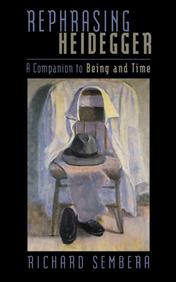Philosophy


Introduction
[…] Heidegger’s philosophical significance will have to rest on his publications. There is no way of getting around these. Few, if any, second-hand accounts can pave the way to them. Almost all of those now available in English are marred by the mere fact that they are found in the misleading context of accounts of existentialism, which Heidegger repudiates. Most of them fail to realize the development in Heidegger’s thinking. And they are even less adequate as introductions to the phenomenological aspects of Heidegger’s work. Thus the challenging problem of providing a real introduction to Heidegger’s thinking remains unsolved to this hour. In stating this I do not mean to imply that it can be solved, especially at this stage when important evidence is still missing. Yet the attempt ought to be made, if only for the sake of better relations between the main philosophical currents of our time. (Herbert Spiegelberg, The Phenomenological Movement. A Historical Introduction. Second edition. Martinus Nijhoff: The Hague/Boston/London, 1978; p. 274.)
The aim of this book is to present the main ideas of Being and Time, Heidegger’s most important philosophical work, in a clear and accessible manner. In so doing, the book also strives to correct certain fundamental misconceptions of Heidegger’s thought, including the mischaracterization of Heidegger as an “existentialist.”
No one could plausibly deny that Being and Time is a dense and difficult philosophical treatise. Its stylistic flaws, even in the original German, are too obvious to excuse. Nevertheless it is equally undeniable that Being and Time is an original, systematic, and epochmaking philosophical work. Without a doubt it was one of the most influential books of the 20th century, and its influence on contemporary thought is continuing and pervasive. I think it is fair to say that on the whole Heidegger’s own stylistic excesses, as well as those of his imitators and, I fear, also of his detractors, have tended to produce a nimbus of unintelligibility surrounding what Heidegger actually believed and thought.
The present exposition is devoted to making the conceptual underpinnings of Being and Time transparent in order that its philosophical significance may be better understood. The title of this book, Rephrasing Heidegger, was chosen in order to emphasize this point. While a certain amount of technical terminology is indispensable to any intellectual work, there are ways of minimizing the burden placed upon the reader’s good will. For the sake of intellectual honesty, I have made concessions that Heidegger himself—it must be emphasized—was not prepared to make. An author, like an educator, has an ethical obligation to the audience to be clear and comprehensible. Whether Heidegger’s rejection of this obligation can be philosophically justified is a question that I myself have answered in the negative.
(...)
Rephrasing Heidegger is addressed primarily to students, both graduate and undergraduate, encountering Heidegger for the first time, as well as to anyone who is in need of a solid acquaintance with Heidegger’s philosophical thought. It is also hoped that the book will be useful as a textbook or companion to seminars on Heidegger, since it was written to fulfill that function for my own seminars.


Excerpt from Rites of Way: The Politics and Poetics of Public Space edited by Mark Kingwell and Patrick Turmel
From Masters of Chancery: The Gift of Public Space by Mark Kingwell
Public space is the age's master signifier. A loose and elastic notion is variously deployed to defend (or attack) architecture, to decry (or celebrate) civic squares, to promote (or denounce) graffiti artists, skateboarders, jay-walkers, parkour aficionados, pie-in-the-face guerrillas, underground capture-the flag enthusiasts, flash-mob surveillance-busters, and other grid-resistant everyday anarchists. It is the unit of choice when it comes to understanding pollution, predicting political futures, thinking about citizenship, lauding creativity, and worrying about food, water, or the environment. It is either rife with corporate creep and visual pollution, or made bleak by intrusive surveillance technology, or both. It is a site of suspicion, stimulation, and transaction all at once. For some, it is the basis of public discourse itself, the hardware on which we run reason's software. Simultaneously everywhere and nowhere, it is political air.
Given the seeming inexhaustibility of the political demand to reclaim public space, what is stranger is that nobody admits they have no idea what it is. Most of us assume we know, but more often the assumption is a matter of piety rather than argument–and confused piety at that. 1 . ..
As with the court, so with a just society. There can be no useful recourse to public space unless and until we reverse the polarity of our conception of publicness itself. It is sometimes said that the threshold between public and private must be a public decision. True, but go farther: the public is not a summing of private preferences or interests, nor even a wide non-rival availability of resources to those preferences or interests. It is, instead, their precondition: for meaning, for work, for identity itself. We imagine that we enter public space with our identities intact, jealous of interest and suspicious of challenge, looking for stimulus and response. But in fact the reverse is true. We cannot enter the public because we have never left the public; it pervades everything, and our identities are never fixed or prefigured because they are themselves achievements of the public dimension in human life.






